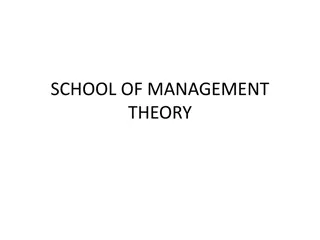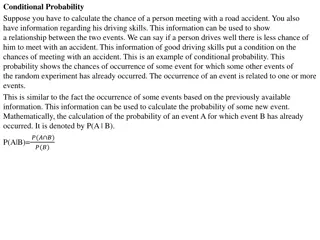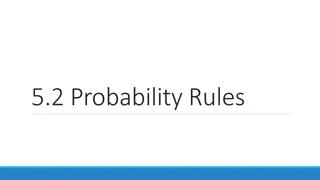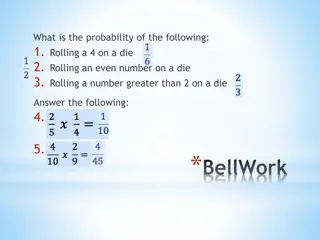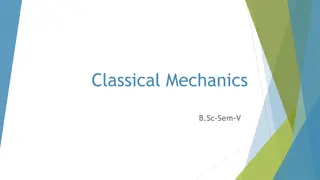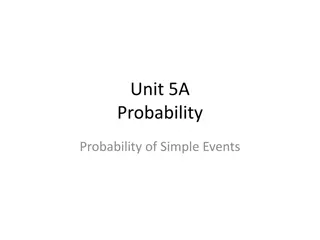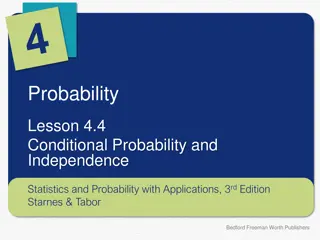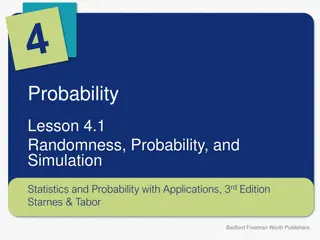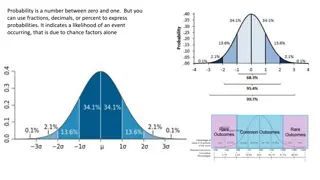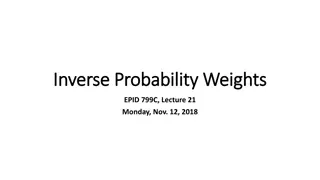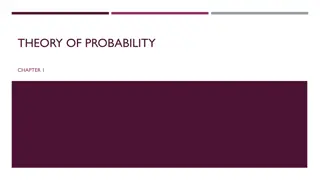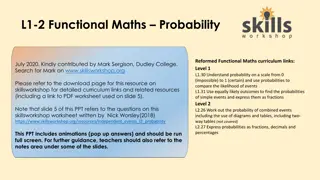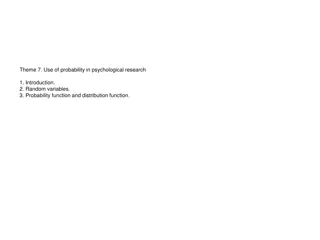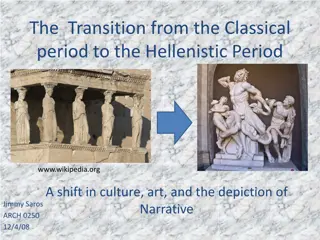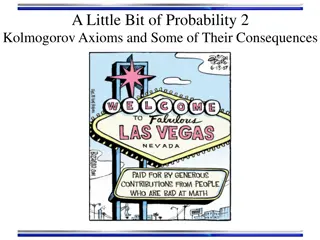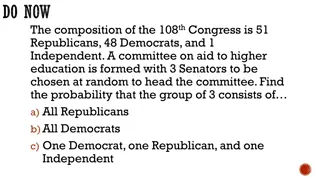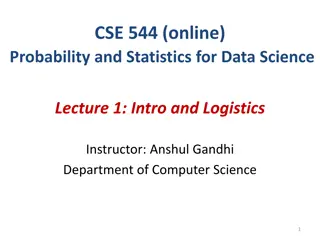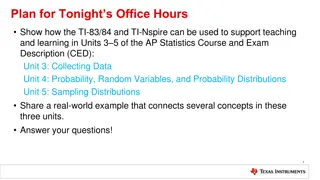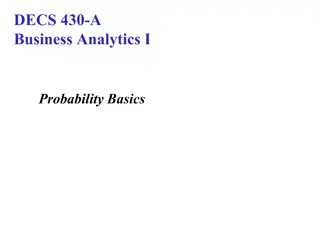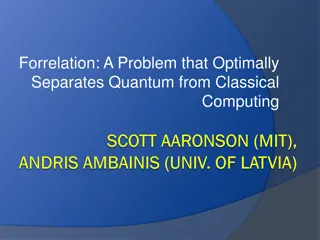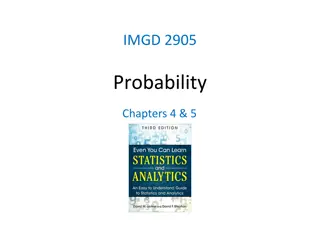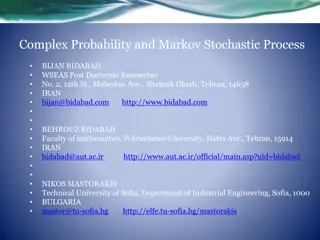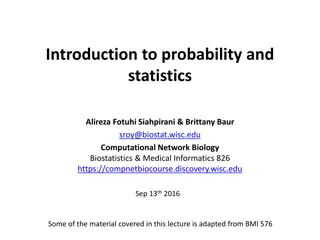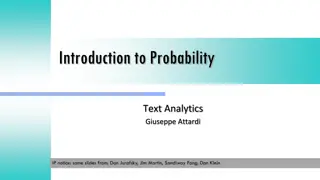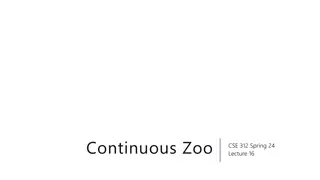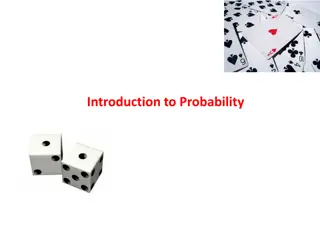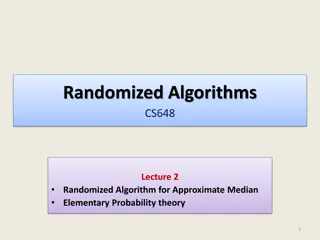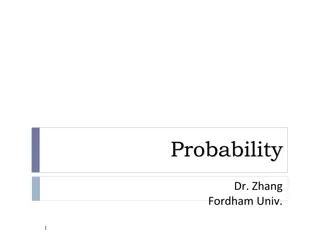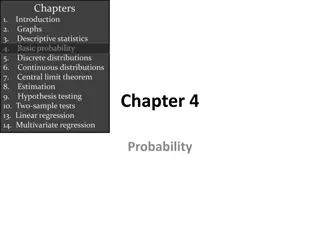Introduction to Probability Concepts in CSE 312 Spring 24 Lecture 5
Today's lecture in CSE 312 Spring 24 covers the basics of probability, including sample spaces, events, and probability calculations. Understand the foundational processes behind quantifying uncertainty, such as flipping coins, rolling dice, and shuffling cards. Dive into concepts like sample spaces
2 views • 26 slides
Evolution of Management Theories: Classical Approach and Scientific Management
Explore the evolution of management theories focusing on the Classical Approach and Scientific Management. The Classical Approach emphasizes efficiency and specialization, while Scientific Management introduced systematic methods to increase productivity. Learn about key figures like Frederick Winsl
6 views • 31 slides
Understanding Conditional Probability and Bayes Theorem
Conditional probability relates the likelihood of an event to the occurrence of another event. Theorems such as the Multiplication Theorem and Bayes Theorem provide a framework to calculate probabilities based on prior information. Conditional probability is used to analyze scenarios like the relati
1 views • 5 slides
Understanding Independent and Dependent Events in Probability
Explore the concepts of independent and dependent events in probability, learn how to determine the probability of independent events using examples, and find out the difference between the two types of events through clear explanations and illustrations. Enhance your understanding of conditional pr
0 views • 39 slides
Understanding Probability Rules and Models
Probability rules and models explain how to calculate the likelihood of different outcomes in a chance process by utilizing sample spaces, probability models, events, and basic rules of probability. Learn about the importance of sample space, probability models, calculating probabilities, mutually e
0 views • 17 slides
Understanding Probability in Events
Explore concepts of probability in various events like rolling a die, compound events, simple events, and spinner probability. Learn how to calculate probabilities of different outcomes and understand the difference between single and compound events. Discover key principles in probability theory an
0 views • 13 slides
Understanding Classical Civilizations: Timeline Analysis and Periodization
Explore the concept of periodization by creating a timeline of significant life events and categorizing them into distinct periods. Learn about classical civilizations, time periods, and the process of dividing history into eras. Dive into the Classical Age and its contributions to human development
1 views • 24 slides
Understanding Classical Mechanics: Variational Principle and Applications
Classical Mechanics explores the Variational Principle in the calculus of variations, offering a method to determine maximum values of quantities dependent on functions. This principle, rooted in the wave function, aids in finding parameter values such as expectation values independently of the coor
0 views • 16 slides
Diverse Music Traditions of India - Classical to Folk
Explore the rich musical heritage of India, encompassing classical Carnatic and Hindustani music, folk melodies, film songs, and pop music. Learn about the intricate nuances of Indian classical music, its historical evolution, and the variety of genres within the music landscape of the country.
0 views • 8 slides
Understanding Probability of Simple Events
Explore the concept of probability by learning about simple events, outcomes, and calculating probabilities using favorable outcomes. Discover how to express probability as fractions, decimals, or percentages through real-world examples like coin flips and dice rolls. Enhance your understanding of c
1 views • 13 slides
Understanding Conditional Probability and Bayes Theorem
Conditional probability explores the likelihood of event A given event B, while Bayes Theorem provides a method to update the probability estimate of an event based on new information. Statistical concepts such as the multiplication rule, statistical independence, and the law of total probability ar
0 views • 15 slides
Examples of Classical and Operant Conditioning
Robert receiving a ticket for driving under the influence illustrates operant conditioning with negative punishments, while Chris being afraid of dogs after being bitten showcases classical conditioning with stimulus generalization. Jacob's joy from smelling his date's cologne demonstrates classical
1 views • 9 slides
Understanding Conditional Probability and Independence in Statistics
Conditional probability and independence are essential concepts in statistics. This lesson covers how to find and interpret conditional probabilities using two-way tables, calculate probabilities using the conditional probability formula, and determine the independence of events. Through examples li
0 views • 15 slides
Understanding Probability and Randomness
Explore the concepts of randomness, probability, and simulation in this informative lesson. Learn how to interpret probability as a long-run relative frequency, dispel common myths about randomness, and use simulation to model chance behavior. Delve into the idea that chance behavior is unpredictabl
1 views • 13 slides
Understanding Probability and Calculating Probabilities with Z-Scores
Probability is a number between zero and one that indicates the likelihood of an event occurring due to chance factors alone. This content covers the concept of probability, the calculation of probabilities using z-scores, and practical examples related to probability in statistics. You will learn a
0 views • 12 slides
Understanding Probability: A Practical Guide with Quizzes
Discover the essentials of probability with lessons on the probability scale, including expressing probabilities in words and numbers using a fair dice example. Explore how to calculate both the probability of rolling a 6 and not rolling a 6. Sharpen your skills with quizzes on Hegarty Maths.
0 views • 19 slides
Understanding Inverse Probability Weights in Epidemiological Analyses
In epidemiological analyses, inverse probability weights play a crucial role in addressing issues such as sampling, confounding, missingness, and censoring. By reshaping the data through up-weighting or down-weighting observations based on probabilities, biases can be mitigated effectively. Differen
0 views • 25 slides
Understanding Probability Theory: Basics and Applications
Probability theory is a branch of mathematics that deals with the likelihood of different outcomes in random phenomena. It involves concepts such as sample space, probability distributions, and random variables to determine the chance of events occurring. The theory utilizes theoretical and experime
0 views • 11 slides
Understanding Probability: Experimental and Theoretical Concepts
Probability is the measure of the likelihood of an event happening, with experimental and theoretical probability being key concepts. Experimental probability involves determining probabilities through experience or experiments, while theoretical probability can be calculated without prior experienc
2 views • 23 slides
Understanding Probability in Functional Maths Curriculum
Explore probability concepts in functional maths, such as understanding probability scales, comparing likelihood of events, calculating probabilities of simple and combined events, and expressing probabilities as fractions, decimals, and percentages. Practice drawing probability lines, simplifying f
0 views • 8 slides
Understanding Probability in Psychological Research
This article delves into the use of probability in psychological research, covering key concepts such as random variables, probability functions, and distribution functions. It explains fundamental ideas like random experiments, sample spaces, types of sample spaces, events, and the formal approach
0 views • 14 slides
Understanding Probability: Concepts and Applications
Probability is the likelihood of an event occurring, with theoretical probability based on all possible outcomes and experimental probability based on results. Events can be independent or dependent, impacting subsequent outcomes. Explore vocabulary, scenarios like rock-paper-scissors, and coin flip
0 views • 15 slides
Transition from Classical to Hellenistic Period: Art and Narratives
The evolution from the Classical period to the Hellenistic period in Ancient Greece brought significant shifts in culture, art, and storytelling. Classical art focused on idealized human forms and naturalistic poses, while Hellenistic art embraced more dramatic expressions and emotions. The narrativ
0 views • 23 slides
Understanding Sampling in Social Research Methods
Sampling in social research involves selecting a portion of a population to draw conclusions about the entire group. It helps save time, money, and allows for accurate measurements. The key principles of sampling include systematic selection, clear definition of sample units, independence of units,
0 views • 19 slides
Understanding Kolmogorov Axioms of Probability and Their Consequences
Exploring the fundamental principles of probability through Kolmogorov Axioms, this content delves into the rules that govern probabilities of events, such as non-negativity, total probability, and the addition rule. Handy consequences like the probability of complements, unions, and intersections a
1 views • 8 slides
Understanding Probability Distributions in the 108th Congress
The composition of the 108th Congress includes 51 Republicans, 48 Democrats, and 1 Independent. A committee on aid to higher education is formed with 3 Senators chosen at random to head the committee. The probability of selecting all Republicans, all Democrats, and a mix of one Democrat, one Republi
0 views • 34 slides
Probability and Statistics for Data Science Course Overview
This online course on Probability and Statistics for Data Science covers essential topics such as Probability theory, Statistical inference, Regression analysis, and more. The course emphasizes the application of statistical techniques in data analysis and provides a solid foundation in Probability
0 views • 37 slides
Utilizing TI-83/84 and TI-Nspire for Teaching AP Statistics Units 3.5
Explore the integration of TI-83/84 and TI-Nspire in supporting teaching and learning in Units 3.5 of the AP Statistics course, covering collecting data, probability, random variables, probability distributions, and sampling distributions. Dive into a real-world example involving the fit of lids on
0 views • 13 slides
Probability Basics and Problem Solving in Business Analytics I
Understanding the basic rules and principles of probability in business analytics, including conditional probability and Bayes Rule. Learn how to solve problems involving uncertainty by decomposition or simulation. Explore how beliefs can be updated using Bayes Rule with practical scenarios like ide
0 views • 13 slides
Quantum vs. Classical Computing: Exploring Forrelation Problem
Delve into the world of quantum and classical computing with the Forrelation problem that optimally separates the two realms. From Fourier correlations to quantum algorithms and classical lower bounds, explore the intricacies of distinguishing between quantum and classical computation through variou
0 views • 29 slides
Understanding Probability in Game Development
Exploring the significance of probability in game development, the content discusses basic probability concepts, examples of probabilities needed for game development, and specific scenarios like the likelihood of successful attacks, rare loot drops, enemy spawns, and time taken for actions. The art
0 views • 72 slides
Basics of Learning: Classical and Operant Conditioning Overview
Types of learning include classical conditioning, operant conditioning, and observational learning. Classical conditioning involves pairing a neutral stimulus with a meaningful one to elicit a response. Operant conditioning focuses on how consequences influence behavior. Terminology like UCS, UCR, N
0 views • 66 slides
Understanding Complex Probability and Markov Stochastic Process
Discussion on the concept of complex probability in solving real-world problems, particularly focusing on the transition probability matrix of discrete Markov chains. The paper introduces a measure more general than conventional probability, leading to the idea of complex probability. Various exampl
1 views • 10 slides
Fundamentals of Probability and Statistics in Computational Network Biology
Explore the fundamental concepts of probability and statistics in computational network biology with a focus on sample spaces, random variables, probability distributions, and notation. Gain insights into the intuitive definition of probability, sample spaces for various experiments, different types
0 views • 39 slides
Introduction to Probability: Key Concepts and Definitions
Explore the fundamental concepts of probability including basic probability, conditional probability, Bayes Theorem, independence, sample space, events, counting, and the definition of probability. Learn about the significance of sample space, event subsets, and how probability laws encode knowledge
0 views • 31 slides
Understanding Probability Density Functions for Continuous Random Variables
Probability density functions (PDFs) are introduced for continuous random variables to represent the likelihood of events in a continuous space. Unlike discrete probability mass functions, PDFs operate with integration instead of summation, ensuring total probability is 1. Consistency and differenti
0 views • 32 slides
Fundamentals of Probability: Sample and Event Spaces
Understanding the basics of probability involves defining sample and event spaces, interpreting probability models, and applying these concepts to solve problems. By the end of the lecture, you will be able to identify sample and event spaces in probability questions and create meaningful probabilit
0 views • 18 slides
Randomized Algorithms for Approximate Median with Elementary Probability
This content covers a lecture on a randomized algorithm for finding an approximate median element using elementary probability theory. It discusses the importance of insight and basic probability in designing and analyzing such algorithms. The lecture presents a simple probability exercise involving
0 views • 25 slides
Understanding Probability with Dr. Zhang at Fordham University
Dive into the world of probability with Dr. Zhang at Fordham University. Explore the basics of experiments, events, and sample spaces, learn how to calculate probabilities using counting methods, rules, and distributions. Understand concepts like conditional probability and the Bernoulli process thr
0 views • 56 slides
Understanding Probability in Statistics
Learn about random experiments, sample space, and probabilities in statistics. Discover the concept of subjective and objective probabilities, classical probability, and empirical probability. Explore events and how they are defined in the context of probability theory.
0 views • 56 slides

